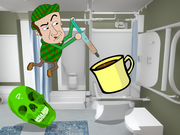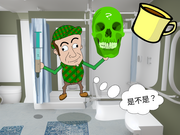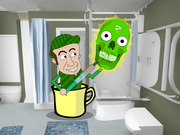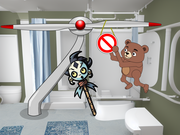(pronoun) this; these / (bound form) this; the (followed by a noun) / (bound form) this; these (followed by a classifier) (in this sense, commonly pr. [zhei4], esp. in Beijing)
to be (followed by substantives only) / correct; right; true / (respectful acknowledgement of a command) very well / (adverb for emphatic assertion)
是
=
旦
+
龰
:
Mnemonic symbol: a skull, from "to be or not to be".
Sherlock Holmes (sh) starts his day in the space station's bathroom (Ø4) with a mug of coffee (旦). Holding a skull (mnemonic symbol for 是) in his hands, he asks himself "to be, or not to be" (是). He wonders if he can make the skull come back to life using lots of coffee, and injects coffee from his mug into the skull using a syringe (龰).
Sherlock Holmes (sh) starts his day in the space station's bathroom (Ø4) with a mug of coffee (旦). Holding a skull (mnemonic symbol for 是) in his hands, he asks himself "to be, or not to be" (是). He wonders if he can make the skull come back to life using lots of coffee, and injects coffee from his mug into the skull using a syringe (龰).
是
=
日
+
下
+
人
:
Mnemonic symbol: a skull, from "to be or not to be".
Sherlock Holmes (sh) watches the Neanderthal Man (人) trying to climb to the sun (日) on a ladder (下) in the space station's bathroom (Ø4). Sherlock is afraid that he'll open the window, so he puts on a big skull (是) and scares him off.
Sherlock Holmes (sh) watches the Neanderthal Man (人) trying to climb to the sun (日) on a ladder (下) in the space station's bathroom (Ø4). Sherlock is afraid that he'll open the window, so he puts on a big skull (是) and scares him off.
ocean / sea / CL:個|个[ge4],片[pian4] / great number of people or things / (dialect) numerous
can / to be able to / might possibly / ability / (physics) energy
to hold / to seize / to catch / to apprehend / to take / (used in the same way as 把[ba3]: to mark the following noun as a direct object)
to walk / to go / to run / to move (of vehicle) / to visit / to leave / to go away / to die (euph.) / from / through / away (in compound verbs, such as 撤走[che4 zou3]) / to change (shape, form, meaning)
走
=
龰
+
土
:
Mnemonic symbol: a Nordic walking pole. Zorro (z) is fighting Neanderthal Man (bottom of 龰) in the outhouse's living room (ou3). Neanderthal Man uses his pennant (top of 龰), and Zorro uses a Nordic walking pole (走). Zorro overcomes Neanderthal Man by using a dirty trick: he throws some dirt (土) at Neanderthal Mans face, who is blinded and hurts his foot with his pennant (the pennant pierces his foot: 龰). Just at this moment Zorro uses the opportunity to sedate Neanderthal Man and rams a syringe (龰) into his shoulder.





